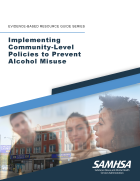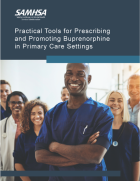Alcohol misuse is focused on binge and heavy drinking patterns within a community or at the population level. This guide will serve as a compendium of key policies for the prevention of alcohol misuse that have been identified as evidence-based by robust scientific literature.
Dashboard: Filter Bricks
Main page content


This guide focuses on research supporting adaptations of evidence-based practices (EBPs) for under-resourced populations. Adaptations involve tailoring care, programs, and services to the cultural, social, gender, and demographic contexts of the people served to yield positive outcomes.

Burnout is a complex issue resulting from chronic workplace stress that encompasses exhaustion, depersonalization, and reduced personal accomplishment. This guide will highlight organization-level interventions to prevent and reduce burnout among behavioral health workers.

This resource provides information to primary care providers and practices on how to implement opioid use disorder treatment using buprenorphine. It identifies common barriers and strategies to overcome them. It documents step-by-step tactics to support buprenorphine implementation.

The guide provides considerations and strategies for interdisciplinary teams, peer specialists, clinicians, registered nurses, behavioral health organizations, and policy makers in understanding, selecting, and implementing evidence-based interventions that support older adults with serious mental illness.

This guide intends to educate clinicians and other stakeholders about the harms of using more than one substance and consideration for addressing concurrent substance use (CSU) and concurrent substance use disorders (CSUD).

This guide reviews literature on treating college students’ mental health concerns, such as anxiety, depression, and suicidal thoughts and behaviors; distills the research into recommendations for practice; and provides examples of the ways that these recommendations can be implemented.

This report provides findings from a qualitative analysis of evidence-based and culturally relevant behavioral health practices offered at NNEDLearn, a SAMHSA training, offered from 2011 to 2020. It includes an overview of NNEDLearn, case studies, strategies and lessons learned, and conclusion.

This guide reviews ways that telehealth modalities can be used to provide treatment for serious mental illness and substance use disorders among adults, distills the research into recommendations for practice, and provides examples of how these recommendations can be implemented.

This Technical Assistance Publication (TAP), updated in 2021, provides guidance for behavioral health service and substance use disorder treatment programs wanting to develop or update a comprehensive, scalable, and flexible disaster plan. It addresses planning needs specific to programs that offer prevention services, outpatient or residential treatment, medically supervised withdrawal, and pharmacotherapy.
Displaying 1 - 10 out of 44

